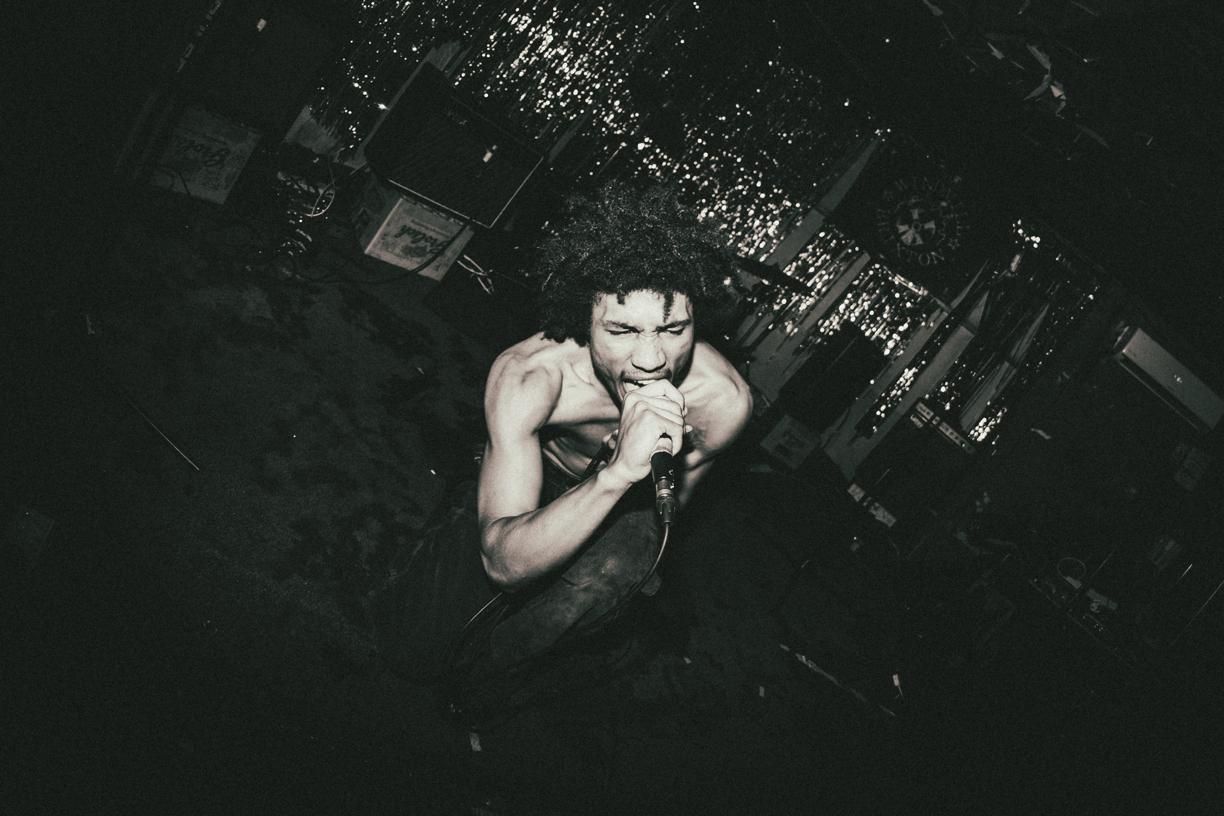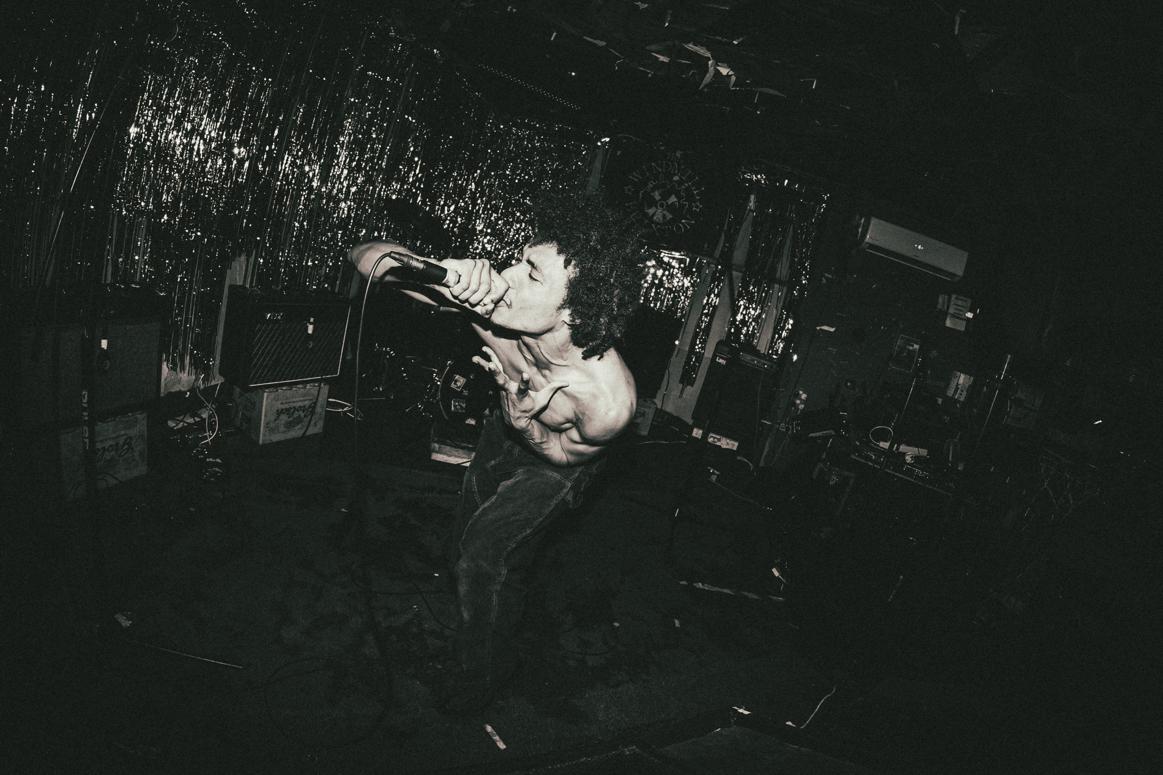 Black Fondu. Photo by Richard Mukuze.
Black Fondu. Photo by Richard Mukuze.
The Opener is The FADER’s short-form profile series of casual conversations with exciting new artists.
Black Fondu keeps his camera off during our video call. Over the course of our 45-minute interview, he’s friendly, enthusiastic, and endearingly well mannered; relating that he listened to a “shit ton of electronic music” as a teen, he catches himself and asks if he’s allowed to swear. When it comes to the details of his personal life, the meaning of his lyrics, and his future moves, however, he’s tight lipped. His first name is Reggie, but his last name remains under wraps.
The 20-year-old abstract grime artist, based in the South East London district of Peckham, has only released one song, and it isn’t on digital streaming platforms. To listen to “SB 1 3,” the hard-hitting track he shared in late April, one must also watch its music video (directed by Reggie himself), which is only available on YouTube. But there’s more music in the vault, as evidenced by several videoed performances at the Windmill Brixton and The George Tavern — where he played his first-ever show early last year — as well as a four-song, 14-minute live set on BBC’s Radio 6 Music. (You can also hear his bars on a short track titled “INTERLUDE,” from London producer Shoplifting’s latest mixtape.)
Still, Reggie claims, all this unreleased material is subject to change. “It was only recently that I started thinking of everything as a demo until it’s out,” he tells me. “I’m getting better every day at mixing and mastering because I want to learn as much as possible, acquire as much experience as I can, before I decide to properly have something finished.” If there’s a plan beyond that, he’s not sharing it.
Family is a recurring theme in Black Fondu’s released and unreleased work. Many of the lyrics on “SB 1 3” are nearly inaudible, consumed by the song’s unruly, glitched-up beat. But the final line of its hook, “Screaming every day ’cos they murdered his kid,” cuts through the noise every time he says it. (The song delves into even darker territory elsewhere, reaching its nadir with a disturbing suicide fantasy.)
Near the end of “Another Domestic,” the second song from his BBC set, the instrumental fades briefly for emphasis as Reggie raps, “Family ain’t shit if you ain’t on the map,” shortly before his sister enters to sing the track’s outro. And in the final passage of “Bikes of spade,” his closer from the same set, he slows things down, singing mournfully about a painful parting — “I’ll try hard not to cry when you leave me” — and rapping directly to his mother: “Mum, I’m sorry that you worry / But it’s this darkness that’s inside me.”
When I ask him about the fraught role of family in his music, though, he’s intentionally vague. “I’ll just say a lot went down in my childhood, and that’s had a great effect on my work,” he says, “so family is important to me.” And when I press him on specific lyrics, he’s noncommittal: “I could tell you what I think it’s about,” he says, referring to his “they murdered his kid” bar. “But I think it’ll be better if you come up with your own ideas. It’s more fun.”
“It’s so difficult — for me, even — to understand why I make the sounds I make.”
Musicality runs through Reggie’s family. Born in Ghana’s capital city, he heard stories of his maternal grandfather, chief of the village where his mother was raised, waking the town’s denizens every morning to the sound of his six-drum setup. Reggie and his parents moved to London before he started grade school. Some of his earliest musical memories are of his father, a musician in his own right, playing Bach, who remains one of Reggie’s favorite composers. He learned to play piano as a pre-teen, favoring the melodies of Rachmaninoff and Chopin. When he was 12, his older brother blew his mind with the Beatles.
Rap and electronic music were later arrivals, but Reggie devoured them when they came. Pulling up a 24-hour-plus playlist from his teenage years, he cites Nas, Tupac, MF DOOM, The Pharcyde, Snoop Dogg, Kanye West, and Mac Miller as early favorites, but he later moved on to freakier pastures.
“My idea of music gradually…” He trails off and starts again: “Not deteriorated, but I unlearned what I thought it was meant to be. It’s only been recently that I’ve been discovering artists who are akin to what I do, who I listen to, like, ‘Damn, they they get it.’” This motley group includes Xiu Xiu, esperanza spalding, Nick Drake, King Krule, and James Blake, none of whom sound much like Black Fondu.
In fact, analogs for Reggie’s music are few and far between, although I hear bits of Sweden’s Varg2TM in his harsh yet flighty production style, and some Dean Blunt (especially as Babyfather) in his ability to channel his lyrics into smooth flows over these uneven landscapes. “It’s so difficult — for me, even — to understand why I make the sounds I make,” he says. “And it changes often. I’ll make a song where suddenly it’s just me and a guitar, even singing. I think it’s hard to pinpoint what sound [I’m going for]. I just want it to be raw and emotional and visceral.”
Reggie started making beats in secondary school, playing them for his friends in the music room during lunch period. In the early days of COVID lockdown, his interest in recording music became an obsession. Over the next two years, as he skated through sixth form, he claims he made 10 to 20 beats a day, uploading the best of them to Soundcloud under his given name. Production quickly outranked studying on his list of priorities, to the point where he began working on his tracks during Zoom class. “My friends would see me headbopping, and they’d be like, ‘Is this guy listening to music right now?’” he remembers. “But I was making beats.”
This prolific period was interrupted only once. “There came a point when something happened in my life that stopped me,” he says, eliding salacious details once again. “I didn’t want to do music anymore, so when I turned 18, I stopped for quite some time.” He pauses, then corrects himself: “Well, to me it felt like forever, but it was only two months.”
“Simplicity is the way.”
Rapping and singing came later, and more organically: “I knew I didn’t need to do too much apart from saying exactly what came to me,” he says. “I’m a strong believer in the subconscious at work. Most of my songs are freestyled on voice memos.”
The visceral nature of Black Fondu’s music is emphasized in his live performances, which have created a buzz in the same Windmill-centered scene that gave us Squid, black midi, and Black Country, New Road. As with those bands, Windmill booker Tim Perry’s willingness to take a chance on him when he was totally untested gave him the foothold he needed to garner some regional clout.
“Reggie was a familiar face at many shows, so it was only fair we gave him a chance, and his first set here went very well,” Perry remembers. “He was up for doing short-notice shows, so he gradually picked up fans, and then word spread and bands started asking for him.”
These groups included fellow South East Londoners Fatdog and Shame, and the ascendant Detroit ghettotech trio HiTech. Just this week, he supported New Orleans synth punks Special Interest in Brighton and Manchester. Perry calls the range of acts attracted to Reggie “a testimony that while Black Fondu’s music is quite extreme, it seems to blow people’s minds, whatever the occasion.” Reggie estimates he’s played the Windmill 15 times in the past year.
 Photo by Richard Mukuze.
Photo by Richard Mukuze.
Black Fondu works alone. Reggie used to send his beats to friends and family, but he soon realized his own taste was his best compass. As he’s grown more confident in his instincts, he’s become more comfortable killing his darlings in service of the greater good. “I started to understand that detail is so important, stuff that you kind of hear but mostly feel,” he says. “And to feel that, you have to get rid of the shit so you only have what’s needed, what brings the feel and strengthens the song.”
This paring down is part of Reggie’s new outlook on life. “I think simplicity is what I’m trying to find now,” he tells me. “Simplicity is the way. I’m obviously very young, and I’m still learning.”